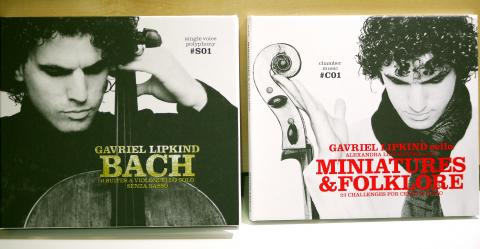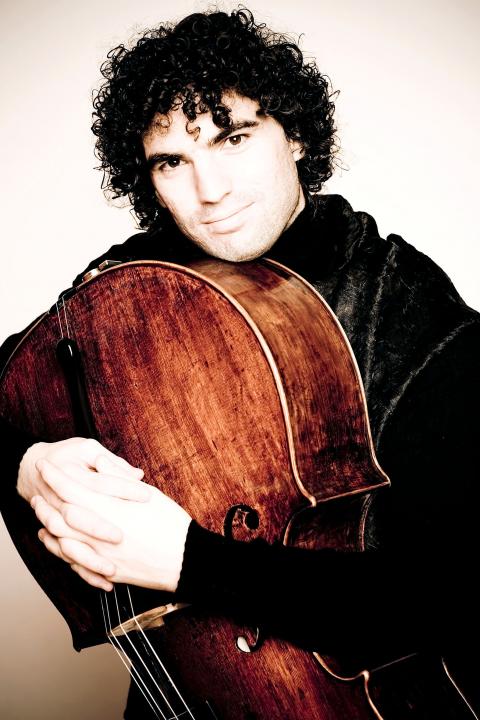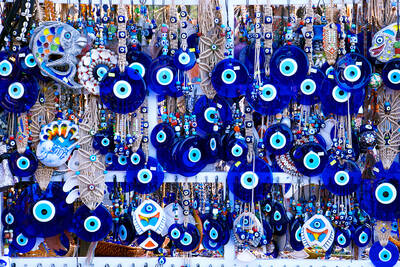Gavriel Lipkind, an iconoclastic 34-year-old Israeli cellist, will make his Taiwan debut at the National Concert Hall in Taipei next Friday. He will play a program of five unaccompanied cello works, including Baroque composer Johann Sebastian Bach’s Suites for Unaccompanied Cello No.3 and No. 6 as well as works by 20th century contemporary composers Gaspar Cassado, Paul Ben-Haim, and Gyorgy Ligeti. At a separate event held as part of the 2012 National Taiwan University (NTU) Azalea Festival, Lipkind will give a free lecture concert about his life as a musician with a cello demonstration at the NTU Center for the Arts in Taipei next Wednesday at 7pm.
In his Taiwan debut, Lipkind will play an Italian cello called the “Zihrhonheimer” cello and labeled “Aloysius Michael Garani (Bologna, 1702).” The cello was built some time between 1670 and 1680. Besides his virtuoso technique and pure tone, Lipkind will incorporate his philosophy of musical analysis into his interpretation. Using his cello, he wants to show audiences that there are more voices simultaneously present and internally heard within one melodic line.
Lipkind, who started playing the cello at the age of six, demonstrated his musical ability at an early age. By the age of eight, he was already studying at the Rubin Academy of Music at Tel Aviv University under world-renowned Israeli cello professor Uzi Wiesel. Lipkind had his Israeli military service waived at 18 and pursued further music studies at the Frankfurt University of Music and Performing Arts in Germany and the New England Conservatory in the US. Lipkind has received numerous international awards, including the Rostropovich International Cello Competition in Paris in 1994, the Leonard Rose International Cello Competition in Washington in 1997 and the Grand Prix Emanuel Feuermann in Germany in 2002. He has performed as a solo artist with some of the most prestigious orchestras in the world.

Photo: Lin Ya-ti, Taipei Times
照片:台北時報林亞蒂
In 2002, at the pinnacle of his career, Lipkind withdrew from the concert stage for three years to focus wholly on the innermost development of his musicianship and rethink his way of playing. During this time, he devoted himself to practicing the cello, studying chamber music, and learning sound engineering. After returning to the stage, Lipkind founded the Lipkind Quartet, which was praised by the Thuringer Allgemeine in Germany as being “well capable of stepping into the footprints of the Alban Berg Quartet.”
Lipkind has made many recordings of the highest quality under his own label Lipkind Productions, including J. S. Bach: Suites for Cello Solo (Single Voice Polyphony I), Miniatures & Folklore, featuring 23 challenging pieces for cello and piano, and Cello Heroics, featuring various cello concerti. Lipkind’s albums are available at Min’s World Classical Music on the ground floor of the National Concert Hall. Samples of some of his recordings are available on Lipkind’s personal Web site (www.lipkind.info).
Unlike the standardized album notes in classical music albums, Lipkind writes his album notes in the form of a long essay, which gives the public the impression that he is not only a fine cellist, but also an erudite music scholar. Late cellist Bernard Greenhouse, founding member of the Beaux Arts Trio, praised Lipkind as “the finest cellist playing today.” Given the fact that Lipkind constantly looks for new ways to make music even better, he is likely to use his own compositional voice to present his in-depth musical interpretation in front of Taiwanese audiences. Tickets are available through NTCH ticketing.

Photo courtesy of New Aspect
照片由新象提供
(Lin Ya-ti, Taipei Times)
對音樂具獨到之見的三十四歲以色列大提琴家凱佛列‧利普金即將於下週五首度訪台,在台北國家音樂廳為台灣觀眾帶來全場五首無伴奏曲目,詮釋高難度巴洛克作曲家約翰‧塞巴斯提安‧巴赫的第三號與第六號《無伴奏大提琴組曲》,與二十世紀現代作曲家加斯巴‧卡薩多、保羅‧班海恩與喬治‧李格第的無伴奏大提琴樂曲。另外,應二○一二臺灣大學杜鵑花節之邀,利普金將於下週三晚上七點在台北臺大藝文中心進行一場免費音樂演講會,分享他的音樂生涯並現場示範演出。
利普金首度訪台將帶來一個名為「Zihrhonheimer」的大提琴,琴身上刻記「Aloysius Michael Garani (Bologna, 1702)」,此琴大約是在一六七○年至一六八○年間於義大利製作的。利普金除了表現精湛琴藝與純淨音色外,他還要將其對樂曲分析的哲思,內化到其演奏中。他要讓一把大提琴,在一條旋律線上,同時傳達多重聲部。
六歲開始學習大提琴的利普金,自幼即展露音樂天賦。八歲時就進入特拉維夫大學魯賓音樂學院就讀,接受國際知名以色列大提琴教授烏茲.維賽爾的指導。利普金十八歲時特准免除以色列兵役,前往德國法蘭克福音樂學院及美國新英格蘭音樂學院就讀,並在國際大賽中屢獲佳績,其中包含一九九四年巴黎羅斯托波維奇大提琴大賽、一九九七年美國華府李納德羅斯大提琴大賽、二○○二年費爾曼大提琴大賽等。利普金也以獨奏家身分與世界知名樂團合作演出。
就在演奏生涯巔峰之際,利普金二○○二年暫別舞台三年,專注於內在音樂性的養成與重新思考其演奏方法。期間,他練琴、鑽研室內樂,並且開始學習錄音工程學。復出舞台後,利普金成立了利普金四重奏,甚至被德國《圖林根匯報》讚譽為「阿班貝爾格四重奏退隱後的接班」。
利普金還透過自己所創的「利普金唱片製作」公司,以最高品質錄製多張專輯,包括《六首巴赫無伴奏大提琴全集(單聲部複音音樂系列一)》、二十三首大提琴與鋼琴挑戰曲集《Miniatures & Folklore》,以及一系列大提琴協奏曲專輯《大提琴英雄》。在國家音樂廳地面層的「小閔的古典音樂世界」,提供利普金專輯的販售,愛樂者也可上利普金官網(www.lipkind.info),試聽幾曲。
不像一般古典音樂專輯制式化的曲目解說,利普金親自編寫長篇的專輯曲解,因而給人一種印象:他不僅是位優秀的大提琴演奏家,也是富含音樂學養的學者。美藝三重奏已故創團大提琴家伯納德.格林豪斯讚譽他為「當今最優秀的大提琴家」。正因利普金總抱持好還能更好的心態做音樂,相信他將會在台灣觀眾面前,以獨特的琴音,帶來富含深度的音樂詮釋。購票請上兩廳院售票網。
(台北時報記者林亞蒂)

Rice is essential to Japanese culture, tradition and politics. People take pride in the oval-shaped sticky Japonica grain, which is still a staple even though total consumption has fallen over the decades. But since last summer, prices have soared as supplies have fallen short of demand. The government has long paid farmers to cut back on rice acreage, and change to other crops to keep rice prices relatively high. To cope with shortfalls this year, the government has released rice reserves. But the grain has been slow to reach supermarket shelves. Anger over that was part of the reason the Agriculture Minister

In Taiwan, 7-Eleven convenience stores can be found on almost every street corner. With over 84,600 stores across 20 countries, 7-Eleven has more locations than any other retail business on Earth. For millions of people, the chain is an important part of daily life, providing coffee, quick meals, and essential items for those __1__. The history of 7-Eleven began nearly 100 years ago in Dallas, Texas. In 1927, the Southland Ice Company began selling blocks of ice that were used to keep fridges cool. Shortly after opening, the company __2__ its offerings to include groceries like milk, eggs, and

Step into any corner of Turkiye, and you’ll likely encounter the iconic “Evil Eye,” known as “nazar boncu?u” in Turkish. This striking blue glass ornament is shaped like an eye with concentric circles of dark blue, white, and light blue. While its name in English suggests something threatening, it’s actually a charm designed to ward off misfortune. The origins of the nazar boncu?u can be traced back to ancient Mediterranean and Middle Eastern traditions. The word nazar comes from Arabic, meaning “gaze,” while boncu?u translates to “bead” in Turkish. Central to the nazar boncu?u’s mythology is the idea that

Continued from yesterday(延續自昨日) https://www.taipeitimes.com/News/lang In 1946, the company adopted the name 7-Eleven to reflect its newly extended __3__, from 7am to 11pm, a novel concept at the time. As a rapidly growing company, it began offering franchise opportunities in the 1960s. In 1974, the first 7-Eleven in Japan was opened by the supermarket company Ito-Yokado. The Japanese franchises were __4__ successful that by 1991, Ito-Yokado was able to acquire a 70 percent stake in Southland Corporation. Its investments eventually resulted in full ownership of 7-Eleven, which paved the way for the Japanese company to enter the international market. Since then, 7-Eleven